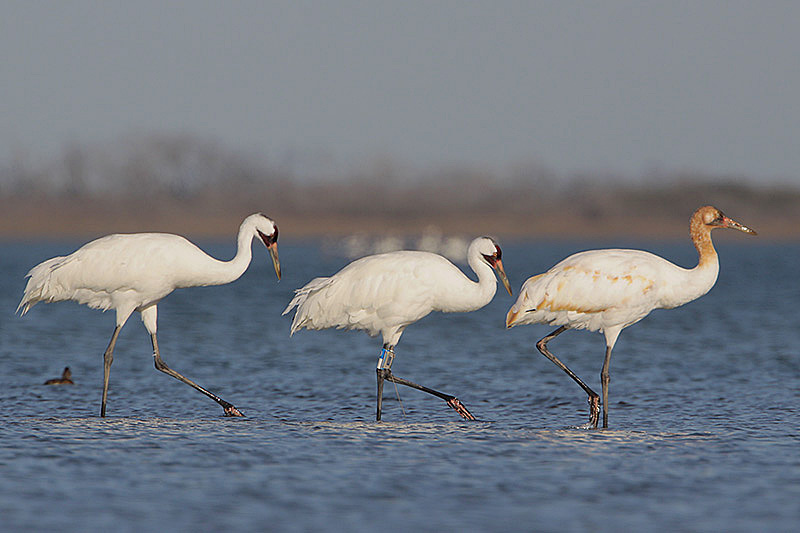
Crane symbolism is rich and varied – these majestic birds are revered across various cultures and stand as symbols of happiness, longevity, and peace.
Among the tallest flighted birds globally, the 15 crane species boast long legs and necks. Their resonant trumpeting calls echo far across the wetlands they inhabit, creating a harmonious melody in the places they call home.
Let’s take a closer look at those creatures, shall we?
On this page
Meaning & Symbolism
Cranes have a rich history in symbolism, deeply rooted in various cultures and mythologies across the globe. These birds are very family-oriented – they form life-long pairs and fiercely attack any intruders. This is why they are often perceived as protectors and symbolize lifelong relationships. They also symbolize family, insight, long life, loyalty, patience, endurance, and communication.
In ancient Turkey, they were believed to usher in good luck, happiness, and fertility as well as represent loyalty and wisdom.
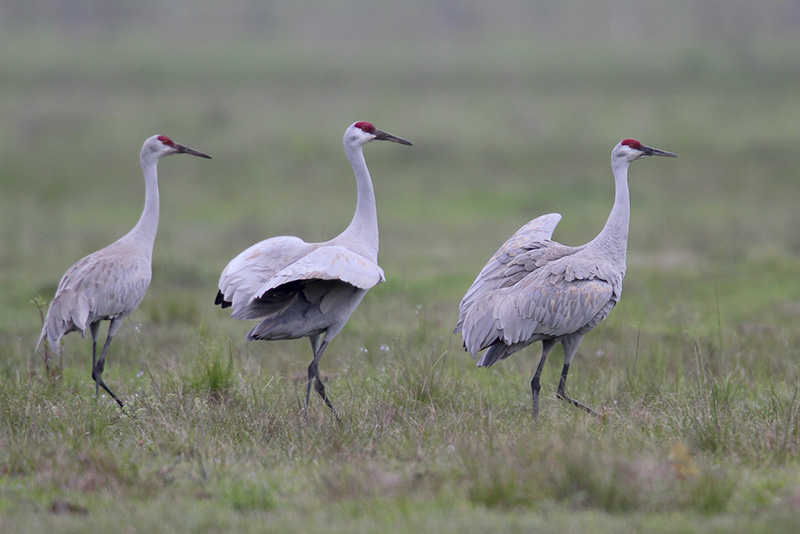
Cranes also stand as symbols of hope, exemplified by the remarkable resurgence of the Whooping Crane population.
Plunging to a mere 15 individuals at one point, these birds faced the brink of extinction. However, their triumphant recovery, as they now number around 800 individuals, offers hope that it is possible to overcome even the most dire circumstances.
Additionally, the Japanese origami art of Senbazuru further underscores the crane’s association with hope and also the wish for peace.
Folding 1,000 origami cranes is believed to hold the power to fulfill a pure, heartfelt wish. A Japanese girl undertook that journey as she was suffering from leukemia as a result of the Hiroshima bombing. She wished for health for her and her family and peace.
What does it mean when you see a crane?
Encountering a crane is usually a sign of good fortune, suggesting that health, longevity, and fulfillment of wishes may be on the horizon. It might also suggest that you should embrace your inner side, the playful side of you, and have some fun. On the other hand, in ancient Greece, the Greek word for crane tied these birds to omens. A crane sighting called for being careful.
Related: What do birds symbolize?
Dreaming of a crane depends a lot on your personal interpretation and the emotion you felt while having this dream. However, generally speaking, dreaming of cranes signifies harmony, prosperity, good luck, and being at peace with your choices.
Some other interpretations include:
- A crane arriving – someone important is coming to visit and carries a possibility to fix a past wrong.
- Surrounded by canes – spiritual awakening. You will find your calling and uncover truths about yourself.
- Crane flying – generally means prosperity.
- Crane flying north – financial trouble.
- Cranes flying in pairs – a positive sign for relationships.
- Flying on a crane – your career will get a boost.
- Cranes flying in circles around you – your partner is devoted, and you can trust them.
- Crane watching you intently – time to become more flexible in your life.
- Cranes dancing – upcoming engagement, commitment, or even pregnancy.
Spiritual Meaning
Spiritually, cranes serve as the messengers of awakening, balance, grace, happiness, and profound spiritual change and growth. In Celtic lore, cranes are intertwined with magic and the Otherworld, as seen in the legendary tales of the Irish god Lugh imitating the crane’s one-legged stance to traverse realms.
Korean culture venerates cranes as symbols of eternal youth and peace, while in India, they represent unconditional love and good fortune. The Japanese regard cranes as sacred birds associated with longevity and marital happiness.
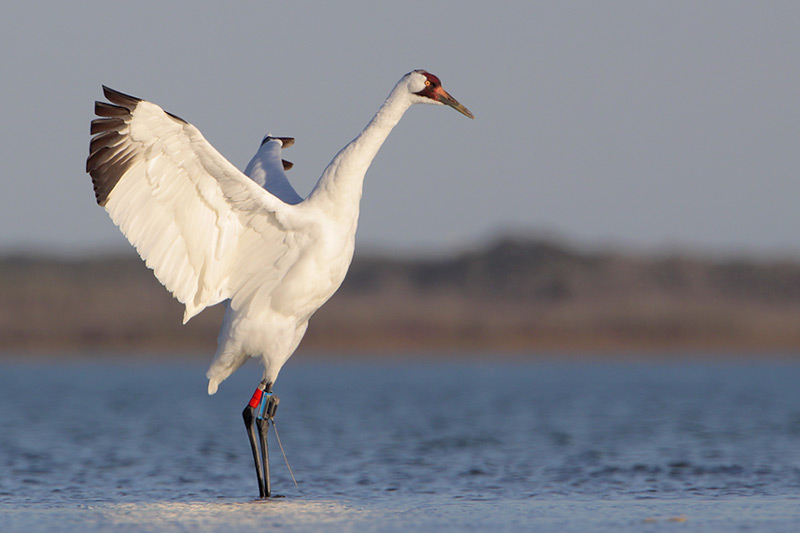
In Native American culture, cranes were often associated with weather phenomena and were considered good luck.
The birds were considered sacred, and their feathers were used in spiritual ceremonies.
Meanwhile, in ancient Greek and Roman cultures, cranes held various symbolic meanings and were often associated with vigilance. In Greek mythology, cranes were linked to the god Apollo and were believed to be symbols of vigilance and communication. The Romans observed the bird’s attentive nature and saw it as a guardian figure.
However, in Roman augury, the practice of interpreting the flight patterns and behaviors of birds for divination, and cranes were not always regarded favorably. Depending on the circumstances, the appearance or behavior of cranes could be interpreted as either positive or negative signs.
The crane as a spirit animal, noted for its selflessness, reflects individuals who prioritize the well-being of others, embodying generosity and putting others before themselves. They’re also resilient, perceptive, yet flexible. However, they can also be oversensitive, indecisive, and isolate themselves.
Longevity
Cultures around the world admire cranes for their resilience and regard them as emblems of a long, healthy life. In symbolism, cranes are often associated with longevity.
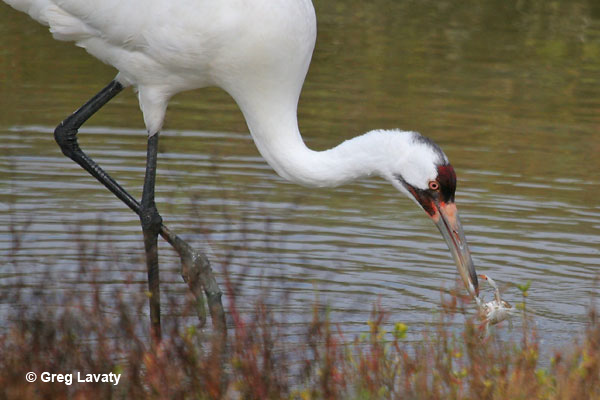
This belief is amplified in Asia, where they epitomize eternal youth. In Japan, for example, cranes are thought to be mystical or holy creatures, believed to live for a thousand years. Their connection to this comes from their long lifespan and migratory patterns, which reflect endurance and the passage of time.
Peace
Cranes symbolize peace due to their serene and calm nature, often depicted in tranquil settings, representing harmony and balance. However, there is also another reason why they’re the symbols of peace, particularly in Japan.
The crane is considered a mystical or holy creature in Japanese culture, believed to live for a thousand years. This belief is deeply woven into the tradition of crafting one thousand origami cranes, where each crane represents a year of the crane’s life.
Inspired by this, Sadako Sasaki, a young victim of the Hiroshima atomic bombing, folded one thousand cranes, wishing for health, peace, and a world free from suffering. Her legacy endures as a symbol of hope.
Happiness
Cranes stand as symbols of happiness across many cultures, notably across Asia, including Japan. Their elegant presence and graceful movements evoke a sense of joy and contentment.
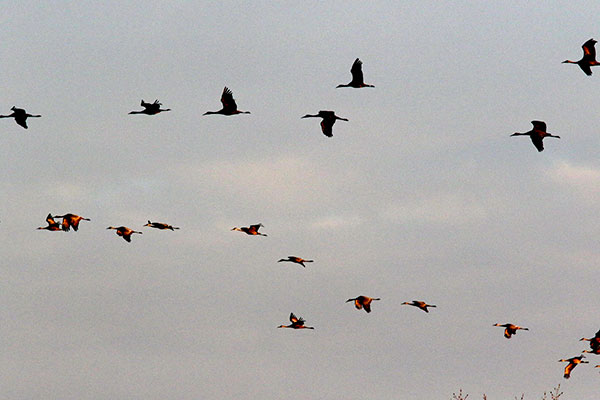
The image of dancing cranes, often associated with playfulness, embodies the spirit of happiness. It reminds us to engage in activities that bring happiness and playfulness to our lives. Keep your spirits high and do something fun!
Crane Tattoo Meaning
Crane tattoos tend to represent many of the positive virtues we already discussed above. This includes happiness, hope, longevity, loyalty, vigilance, and peace.
A crane tattoo can be regarded as a symbol of loyalty and successful marriage, especially if there are two cranes depicted on the tattoo. That is because cranes mate for life and are loyal and very family-oriented.
The crane’s remarkable lifespan contributes to its representation of longevity, health, and healing in these tattoos, signifying a desire for a prosperous and long life.
An origami crane tattoo introduces a unique layer of symbolism, representing peace, hope, and innocence. It may also signify your wish. This comes from the Japanese myth that cranes live for a thousand years and if you make a thousand origami cranes, one for each year, then the crane will grant you your wish. Provided it is a wish made with pure heart.
Meanwhile, depictions of cranes with stones in their leg or beak hold a distinct meaning, signifying vigilance and concentration.
Crane Symbolism: FAQ’s
What does a crane symbolize?
A crane symbolizes happiness, longevity, peace, loyalty, vigilance, and hope.
Are cranes good luck?
Cranes are considered symbols of good luck in many cultures.
What does a pair of cranes symbolize?
A pair of cranes symbolize a successful and loyal marriage, reflecting their lifelong commitment and family-oriented nature.
Are cranes intelligent?
Cranes are considered intelligent birds.
What does the crane symbolize in Buddhism?
Cranes symbolize reincarnation and longevity in Buddhism.
What does the Celtic crane symbolize?
The Celtic crane symbolizes magic, wisdom, and shapeshifting.
What does a crane represent in Chinese mythology?
In Chinese mythology, cranes represent immortality, wisdom, good luck, prosperity, and longevity.
Conclusions
Even though there are only 15 crane species, then their symbolism is rich and their influence carries over ages and cultures. They symbolize happiness, peace, longevity, loyalty, and hope.
From the Japanese origami to the remarkable recovery of the Whooping Crane population, these graceful birds inspire hope.
Throughout cultures and beliefs, they serve as messengers of spiritual awakening and growth, balance, and happiness but also as paragons of vigilance and protection. Whether encountered in dreams, revered as spirit animals, or inked onto skin in tattoos, cranes urge humanity toward happiness, longevity, and peace.
